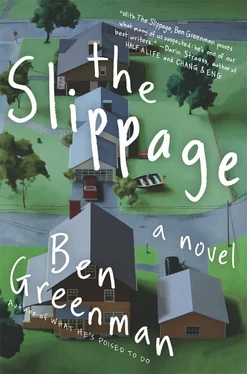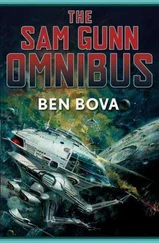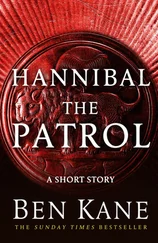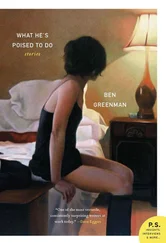“Is that him?” He swung the bottom of his beer bottle toward the dad at the far end of the kitchen, whose name he thought was Randy. The girl shook her head. “Well, if that’s not him, he’s probably not here. The grown-ups who dropped kids off haven’t all come back yet.”
“Okay,” she said. “He said I could get a bracelet on the way home,” she said. She pointed at his phone: “What’s that?”
“It’s a telephone.”
“I know,” she said. “I mean on your hand.”
He looked back down. There was a tiny bug on the knuckle of his thumb. “Oh,” he said. “Not sure. A fly?”
“It’s an immature wasp. We studied them in fourth grade. In England, they brought them in to kill whiteflies.”
William shook his hand until the assassin dropped off. “What’d you study in fifth grade? Mature wasps?” She didn’t laugh. She stared up at him instead, and he wondered what she saw. “I wish my dad would get here already,” she said. “He’s always late. So disappointing.” She was hard-hearted; there was no one she loved. Even her father was only a way of getting to the store.
This was the girl Christopher was describing as the ringleader.
They were sitting with the windows down, on the edge of the duck lake, where William had stopped on the way home from the party. Christopher sipped a milkshake. Directly in front of them, an older man was on a park bench, throwing pieces of bread to the ducks. He seemed to be aiming for them. “We were tossing this ball back and forth, and this one kid just ran in and kicked it,” Christopher said. “It went over the fence. He was laughing, and that girl, Alana, walked right up to him and slapped him in the face. And not a play slap either. Hard. He started crying and snot came out of his nose, and instead of wiping it on his sleeve he pinched it and it hung there.”
“A gobbet.”
“What?”
“That’s the word. A lump of it.”
“Doesn’t it mean a cup?”
“Not a goblet. A gobbet.”
Christopher pinched his fingers together and held his hand away from his body as if it wasn’t his. “It was disgusting, but the kid didn’t know what to do with it. Eventually he brought his hand back and wiped it on his pants, and Alana started pointing and laughing at that.” He frowned. “Last summer at camp, she picked on a girl so bad. She’s going to end up in jail or worse.”
Out in the park, the old man on the bench stood up. He was hulking, Reeser’s height at least, and he moved unevenly, as if one leg was damaged. As he went through the park, parents near him began to collect their children. “He’s big,” William said.
“Yeah,” Christopher said. He sounded unconcerned. “Then we had to sit and watch a stupid movie. It was animated, with a dog, and it was for kids at least three years younger.”
“I wish somebody told me about it,” William said. “I was trapped in the kitchen with adults I didn’t know.”
“You wouldn’t have liked it. Like I said, it was stupid.” He wasn’t ready to move on from Alana. “People like her for no reason, even though she acts like an idiot. Her parents got a divorce last year and kids said that was the reason. But what’s the reason now?”
“You didn’t act worse when your mom and Matthew split up.”
“Matthew wasn’t my dad,” Christopher said. “I didn’t like him.”
“Why not?”
“When my mom wasn’t around he made lots of jokes about how rich she was, even compared to him. And then he always said something about how it didn’t matter. Why would someone keep talking about something if it didn’t matter?”
“Maybe he was trying to teach you a lesson.”
“I doubt it.” He swirled what remained of the milkshake around the bottom of the cup. “Did you know my dad?”
William drew a breath. He weighed the value of honesty and could not, in the end, find any. “Yes,” he said. “He was a great guy. You’re very much like him.”
“I am?”
“You look like him, for starters.”
“You know what I read in a book? In ancient Rome, more than one-third of children lost their fathers before the age of ten.”
William didn’t know what to do with that information. “And there’s a kind of quiet he had that you have also. He didn’t always want to talk, or want other people to. You seem like you feel that way sometimes.”
“My mom thinks I’m sad when I don’t talk, but actually I’m happy. Mostly I like watching people, and talking gets in the way of that.”
“It gets in the way of watching?”
“Of noticing and then thinking about what you notice.” The conversation had become, unaccountably, meaningful. “Like Matthew. On the last day I saw him, he was dressed up fancy to impress my mother, but he had food in his beard. A gobbet.”
“Ew,” William said. “I’m so happy I taught you that.” The man in the park was pointing up into a tree, gesturing more broadly now. He had one long finger extended in front of him. William started the car but did not put it in gear. He did not want to be the kind of man who left a place simply because someone he didn’t know was doing something he didn’t understand. But when the man turned and came toward them, William backed out. He had a child to protect.
Louisa was in the kitchen, reading a catalog. He moved until he was right above her and bent to kiss the crown of her head. “I’m ready.”
“For?”
“For the house,” he said. “I’ll do it. We’ll do it.”
She angled her head back until she could see him. “Really?” Her eyes were bright.
“I just figured that if the wife wants, the wife wants. Who am I to stand in the way?” The edges of her eyes began to cloud with gratitude, or possibly suspicion, and he advanced the frame. “I’ll call a contractor tomorrow.”
William went to sit on the deck. The evening was clear and cool. His favorite bird sang in the tree above, piercing notes going up, and then, like a heavenly visitation, it appeared at low branches, still singing, and landed on the corner rail of the deck. It was tiny, with brown-streaked feathers and a red cap; its head moved in quick flicks. William wasn’t sure he had ever seen it before, and if he had, he hadn’t known he was seeing the bird he loved so much to hear. He froze, afraid to move, and he and the bird stayed like that, looking at each other. That was when he heard shuffling in the kitchen and the glass door dragging open. At the sound of Louisa’s foot against the deck, the bird flew out into the yard in a perfect sight line. It was going away, but it looked like it was only getting smaller.
Once, when they were young, William and Louisa had gone downstate with another couple, a woman from the advertising side of the newspaper and the woman’s boyfriend. It was the culmination of a few months of light complaint on Louisa’s part that they never vacationed. “You’re content to stay here in town,” she said. “And I am, too, for the most part. It’s just that sometimes I like to get away. It gives me perspective. You know: see how the other half of my mind lives.” William had started collecting brochures for scuba getaways and hiking trips, but then one afternoon Louisa had called him to announce that she had, on both their behalf, accepted an invitation to drive into the foothills for a long weekend.
The house belonged to the other couple, or rather it was the man’s family’s vacation home, so William and Louisa were guests. They played their roles willingly, taking off their shoes at the front door, agreeing to predetermined meal times, happily packing into the car whenever a destination was suggested. The other woman, Marilyn, was dour and had eyes ringed by worry, but she came alive in the country; the man, Mike, who was timid in most of the rest of his life, did not mind lecturing them about the region, about which he seemed to possess an endless storehouse of information. And so the two women drank wine and cooked a little, and the four of them drove to antique shops and farmers’ markets and then to a red cliff nearby that Mike insisted offered the best view of the river that wound through the countryside. It was a midelevation alluvial river, he said, and as a result very rare. “This is a backseat kind of vacation,” William said the first night, when they were in bed in the guest room, which had been Mike’s room in childhood.
Читать дальше












